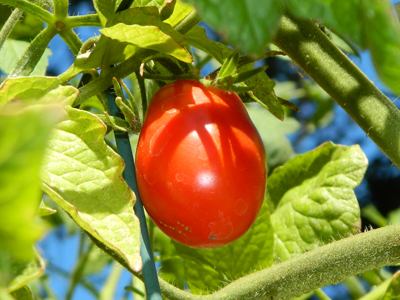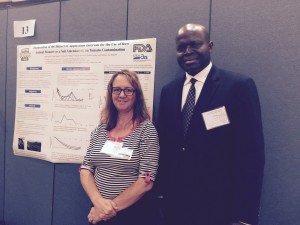A Healthy Harvest – Researchers Explore Impact of Use of Raw Animal Manure on Tomato Contamination
Chris Brunner, August 31, 2015
 The tomato harvest is in full swing. Tomato harvesting equipment and trailers topped with the plentiful harvest are a welcome site on a warm summer evening drive along the dusty rural county roads. The scent drifting from a tomato processing plant provides a sense that all’s right with the world. Green-thumbed home gardeners are sharing their bumper crops of juicy red tomatoes with neighbors and co-workers.
The tomato harvest is in full swing. Tomato harvesting equipment and trailers topped with the plentiful harvest are a welcome site on a warm summer evening drive along the dusty rural county roads. The scent drifting from a tomato processing plant provides a sense that all’s right with the world. Green-thumbed home gardeners are sharing their bumper crops of juicy red tomatoes with neighbors and co-workers.
Conventional growers and home gardeners alike, use soil amendments such as compost and manure to improve soil productivity and soil quality, and to enhance populations of helpful microorganisms in the soil. Organic producers largely rely on manure and compost to add to the fertility of their fields.
A healthy harvest is the end goal. However, application of untreated biological soil amendments of animal origin (raw animal manure) may represent a potential risk for fresh produce of contamination with enteric pathogenic bacteria. In collaboration with the U.S. Department of Agriculture, (USDA), the U.S. Food and Drug Administration, (FDA), is undertaking critical research to strengthen scientific support for any future proposal regarding the appropriate time interval(s) between application of biological soil amendments and harvest.
A group of researchers from UC Davis’s Western Center for Food Safety, (WCFS), the USDA Agricultural Research Service, (ARS), and the FDA’s Center for Food Safety and Applied Nutrition, (CFSAN), are contributing to that research. The objective of their study is to examine the survival of generic E. coli cocktail strains applied to soil amended with manure for 9 months following application and potential transfer to tomatoes. They also aim to compare survival of E. coli on soil amended with different animal manure types: horse, cattle, goat, chicken litter and no manure (control).
This collaborative research helps provide a better understanding about pathogen survival in manure amended soil as well as the potential transfer of pathogens from manure in amended soil to crops such as tomatoes, and the potential food safety and public health consequences of using raw manure as a fertilizer.
The scientific collaboration between UC Davis, the FDA and the USDA-ARS was on display at the 5th Annual FDA Foods and Veterinary Medicine Science and Research Conference held August 13 – 15, 2015, at the FDA Headquarters on the White Oak Campus in Silver Spring, Maryland. The conference provides a chance for scientists to share important research being conducted within the FDA Foods and Veterinary Medicine Program and provides a forum for networking and scientific exchange.

Dr. Michele Jay-Russell and Mr. David Oryang standing by their poster, during the poster session of the conference, following their oral presentations.
Dr. Michele Jay-Russell, Program Manager with WCFS and Liaison to the Western Institute for Food Safety (WIFSS), and Mr. David Oryang, with the FDA, presented a poster entitled: “Exploration of the Impact of Application Intervals for the Use of Raw Animal Manure as a Soil Amendment on Tomato Contamination.” Oryang and Jay-Russell were also invited to orally present their work during the general session of the conference on Friday, August 14. The conference award judges presented them winners in the category of “Outstanding Scientific Collaboration.”
Mr. Oryang says that the mechanism that has been set up between the FDA and WCFS enables the researchers to more directly plan and conduct research that tests the relevant hypotheses, and provides the data that FDA needs. He shares that the “Collaboration is especially rewarding because the WCFS scientists are quick to understand what FDA needs, and have always worked with us as colleagues, to ensure that our exacting standards and goals are met.”
The findings of the study suggest that generic E. coli experiences multiple log reductions over 120 days, but exposures to rain fall can temporarily reverse these reductions. These results indicate that the use of raw or untreated manure may be a source of field contamination with pathogens. However, no E. coli contamination of tomatoes from the manure amended soils we observed in this limited study meaning more research is needed to characterize the long term effects of rain, and the probability of transfer of pathogens from manure amended soils to tomatoes. It is not known how the extended drought in California might have affected these results, so additional studies are needed during normal and wet years for comparison.
What does all of this mean for the backyard gardener?
Dr. Jay-Russell offers that, “Although raw animal manure may be convenient and cheap (especially if you or a neighbor has livestock), it clearly increases the risk of accidentally contaminating your fruits and vegetables with pathogens that may make you sick.” The best advice she says, “Is to use only properly composted or heat-treated manure fertilizers or green (plant-based) compost.”
To learn more about composting, and read about upcoming workshops, contact your local UC Master Gardener Program. For more food safety tips, see the UC Division of Agriculture and Natural Resources’ publications, Tomatoes: Safe Methods to Store, Preserve, and Enjoy, or Food Safety Tips for Your Edible Home Garden.
Read more about standards for the growing, harvesting, packing, and holding of produce for human consumption in the FSMA Proposed Rule for Produce Safety. Fresh produce growers can learn more about the regulatory requirements included in the U.S. Food and Drug Administration’s proposed FSMA produce safety rule at Produce Safety Alliance.
